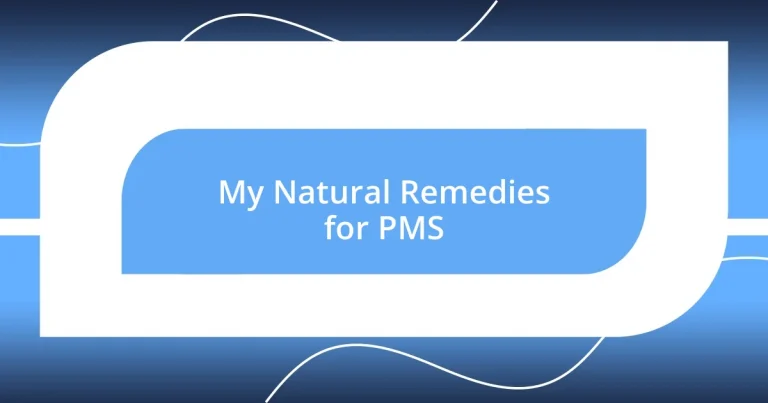Key takeaways:
- PMS symptoms vary greatly among individuals, encompassing both physical (like bloating and fatigue) and emotional aspects (such as mood swings).
- Implementing lifestyle changes, including staying hydrated, eating balanced meals, and practicing mindfulness, can significantly alleviate PMS symptoms.
- Natural remedies such as herbal teas, essential oils, and heat packs provide comfort and relief from PMS cramping and mood disturbances.
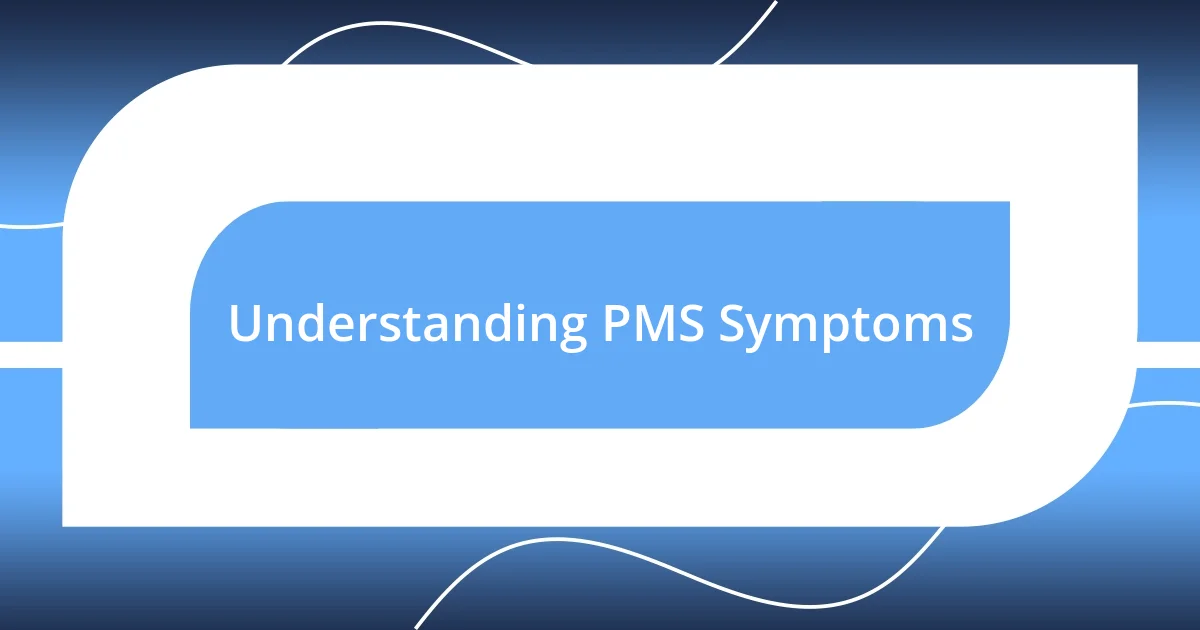
Understanding PMS Symptoms
PMS symptoms can differ widely from one person to another, making it crucial to understand what to expect. I remember the first time I really paid attention to my symptoms; it felt like I had a rollercoaster of emotions coursing through me. Is it just me, or do you also find that some months feel worse than others?
Physical symptoms often accompany the emotional aspects, such as bloating, fatigue, and breast tenderness. I often felt bloated and irritable, and I wondered why this was happening to me each month. It’s almost as if my body has its own agenda, making it challenging to navigate daily life. Have you ever had those days where getting out of bed feels like an Olympic sport?
Understanding these symptoms helps in finding the right natural remedies that suit your unique experience. For instance, I’ve found that taking short walks can significantly ease my mood swings, while herbal teas can help with bloating. How have you managed these symptoms? Recognizing and addressing them personally is essential for creating a more manageable routine.
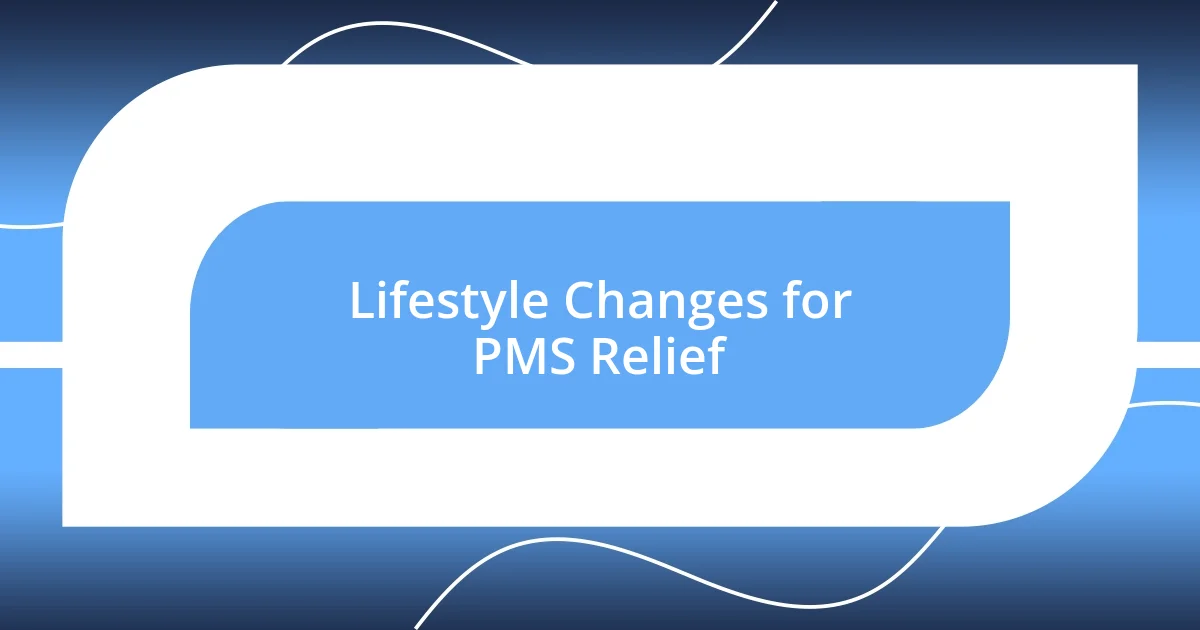
Lifestyle Changes for PMS Relief
When it comes to alleviating PMS symptoms, I find that small lifestyle changes can make a significant impact. For me, incorporating regular exercise has been a game-changer. I used to dread my workout routine during that time of the month, but I’ve learned that even a brisk walk or gentle yoga can elevate my mood and help ease tension. It’s fascinating how just moving my body can transform my mental state; I really wish I had discovered this sooner.
Here are some lifestyle changes that might help:
- Stay Hydrated: Drinking plenty of water can reduce bloating and fatigue. I carry a water bottle to remind myself to sip throughout the day.
- Eat Balanced Meals: Nutrition plays a key role. I noticed that including whole grains, fruits, and vegetables helps maintain my energy levels.
- Get Enough Sleep: Prioritizing rest has become essential for me. I aim for at least 7-8 hours of quality sleep, especially during PMS days.
- Practice Mindfulness: Engaging in mindfulness activities like meditation calms my racing thoughts. It feels like a warm hug for my anxious mind.
- Limit Caffeine and Sugar: I’ve noticed that reducing coffee and sugary snacks helps prevent those intense mood swings. Replacing them with herbal teas has been a soothing alternative for me.
These changes, though seemingly small, have drastically improved my experience with PMS. Have any of these strategies worked for you?

Natural Remedies for PMS Cramping
Natural Remedies for PMS Cramping can be very effective when you tap into the power of nature. Personally, I’ve found that ginger tea works wonders for soothing cramps. It’s not just about the taste; that warm, spicy drink envelops me like a cozy blanket, and I’ve noticed a significant reduction in pain right after sipping it. Have you ever tried this? It feels fantastic to find a remedy that not only relieves discomfort but also feels nourishing.
Another remedy that I swear by is the use of heat packs. There’s something incredibly soothing about applying warmth to my abdomen. I remember one particular evening when I was curled up with a hot water bottle, feeling the tension melt away. It’s a simple pleasure, but having that warmth against my skin turns a painful evening into a manageable one. Have you had a similar experience with heat? It’s almost like a natural hug for your belly.
Additionally, essential oils can be a delightful addition to your cramping routine. I often use lavender and peppermint oils in a diffuser or mixed with a carrier oil for a calming massage on my lower belly. The scent combined with gentle pressure creates a sense of relief that’s hard to match. But what about you? Have any specific scents made a difference in your life?
| Natural Remedy | Benefits |
|---|---|
| Ginger Tea | Reduces cramping and bloating, provides warmth and comfort |
| Heat Packs | Relieves pain and tension; provides soothing warmth |
| Essential Oils | Calming effects, can ease tension through scent and massage |
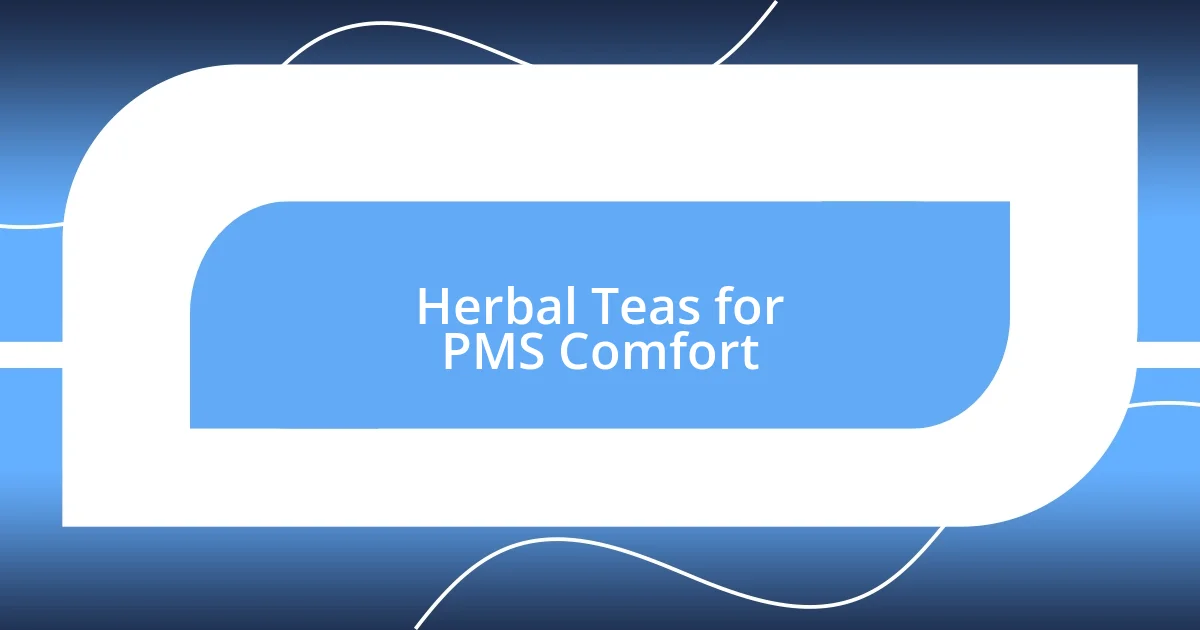
Herbal Teas for PMS Comfort
Herbal teas have become my sanctuary during the challenging days of PMS. One of my personal favorites is chamomile tea; it works like a gentle embrace, calming my nerves and easing irritability. There’s something so comforting about the floral aroma that fills the room as it steeps—have you ever noticed how a simple scent can shift your mood?
Peppermint tea often joins my lineup, especially when I’m feeling bloated. I remember a particularly tough afternoon when I brewed a steaming cup, and as I sipped, I felt a wave of relief wash over my uncomfortable belly. It’s remarkable how the cooling properties can provide a soothing counterbalance to that restless feeling. Have you tried incorporating peppermint into your routine?
Finally, I can’t overlook the calming benefits of raspberry leaf tea. It became my go-to during my first few cycles, and I must say, the earthy taste grew on me quickly. My experience has been that it doesn’t just aid in relieving cramps; it also brings a sense of stability to my emotions. That warm cup in hand feels like an invitation to slow down and breathe—can you relate to that feeling of comfort?
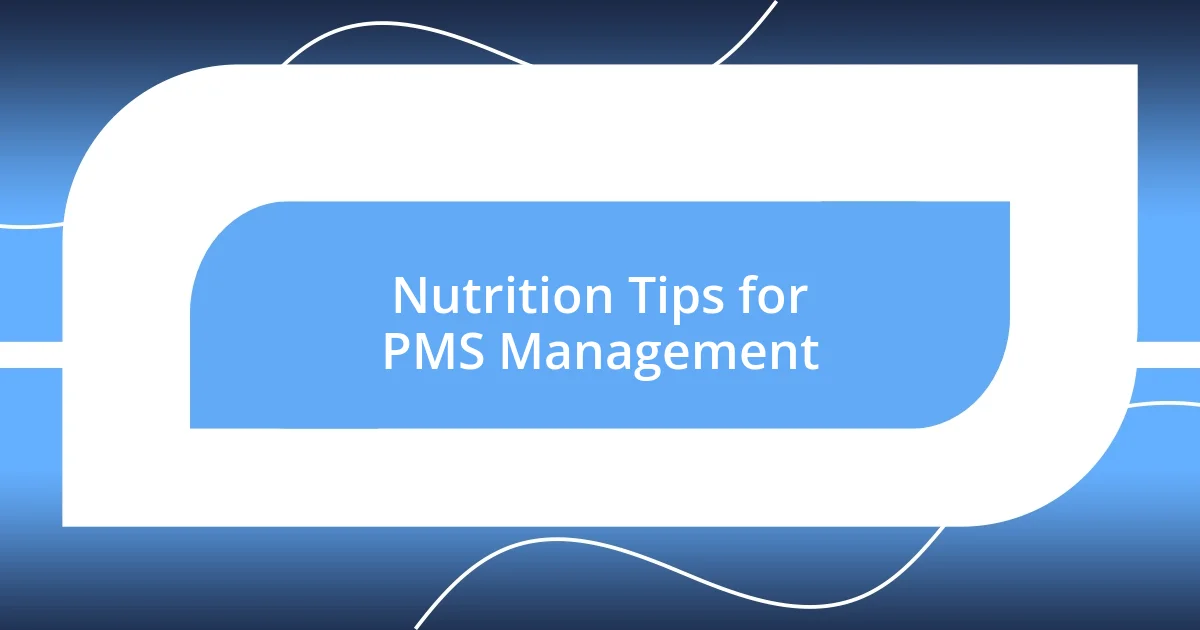
Nutrition Tips for PMS Management
Eating well plays a crucial role in managing PMS symptoms, and I’ve learned that certain foods can make a noticeable difference. For instance, incorporating more magnesium-rich foods, like spinach and pumpkin seeds, helps me feel less bloated and irritable. Have you ever paid attention to how certain foods impact your mood? It’s often surprising how big of a change some simple dietary adjustments can create.
I also find that hydration is key during this time. Drinking plenty of water not only helps with bloating but also keeps my energy levels more stable. On days when I forget to hydrate, I instantly feel sluggish. Have you noticed how the little things can add up, especially when it comes to your overall well-being?
Another tip that has benefitted me is including omega-3 fatty acids in my diet. I try to incorporate foods like salmon and walnuts regularly. I remember one week when I had more fish, and I felt noticeably calmer and less plagued by mood swings. Isn’t it fascinating how our food choices can lead to such tangible effects on our emotions? Making these mindful choices has truly made a difference for me.
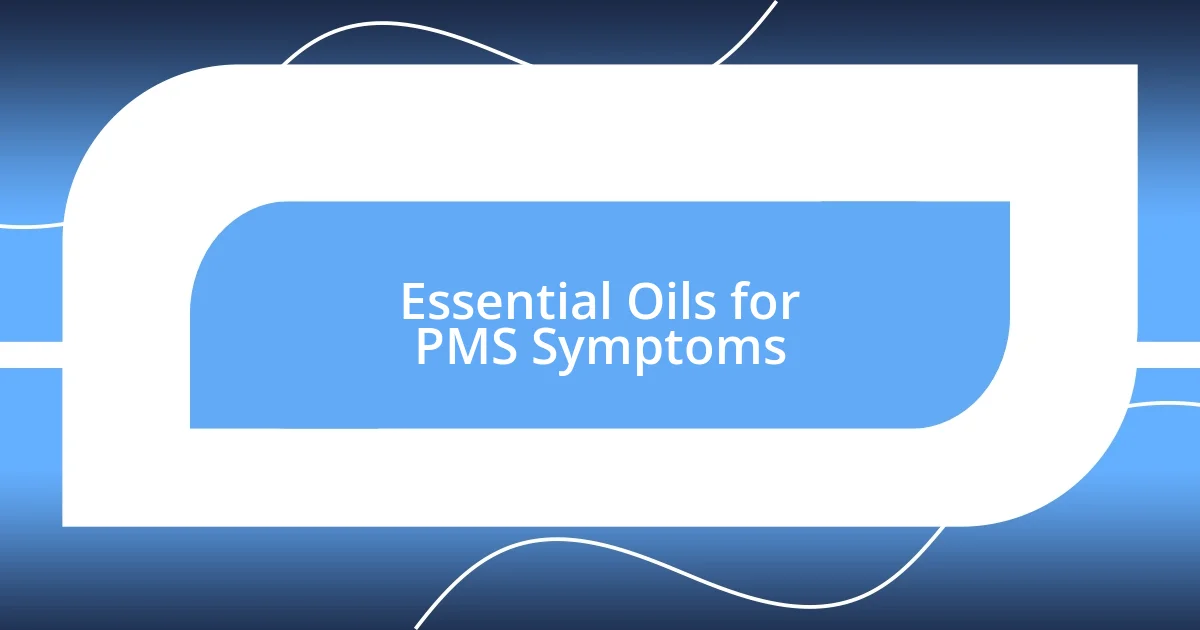
Essential Oils for PMS Symptoms
When it comes to dealing with PMS symptoms, essential oils have become my little treasures. For instance, lavender oil has been a game changer for my mood swings and anxiety. Just one whiff can transport me to a calm place; have you experienced that profound shift a scent can bring? I often diffuse it in my living room, and the cozy atmosphere makes a world of difference during those rough days.
Another oil I can’t live without is clary sage. I remember a particularly tough week when cramping hit me like a freight train. I decided to mix a few drops of clary sage with a carrier oil and applied it to my lower abdomen. The relief was both soothing and almost instantaneous. Do you find that taking a proactive approach helps you cope better with those pesky symptoms? I certainly do.
Lastly, I occasionally rely on peppermint oil as my go-to pick-me-up. It’s like a refreshing splash of coolness when I feel overwhelmed or sluggish. I sometimes dab a little on my temples, and it feels like a mini reset button for my mind. Have you explored the invigorating effects of peppermint oil in your routine? If not, it might be time to give it a shot!
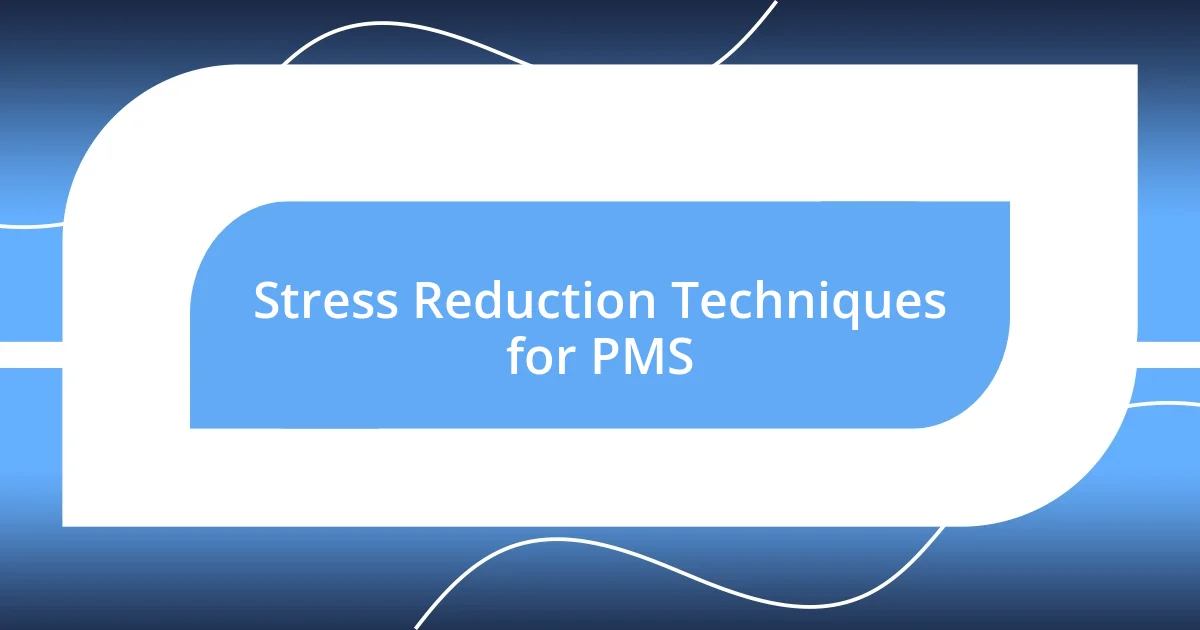
Stress Reduction Techniques for PMS
During challenging PMS weeks, I’ve discovered that deep breathing exercises are a lifeline. Taking just a few minutes to focus on my breath has an almost magical ability to calm my racing thoughts and soothe the tension in my body. Have you ever noticed how simply pausing for a moment can make an enormous difference in your day? It’s like giving my mind a little vacation, even if it’s just for a few breaths.
Another technique I often turn to is gentle yoga. I remember one particularly overwhelming day when I felt tension in my shoulders and back. I rolled out my yoga mat and devoted 15 minutes to simple stretches and poses, and it was like a gentle wave washing over me. Connecting movement with breath helped me not only release built-up stress but also brought a sense of grounding that I desperately needed. Isn’t it amazing how a little movement can transform your mindset?












